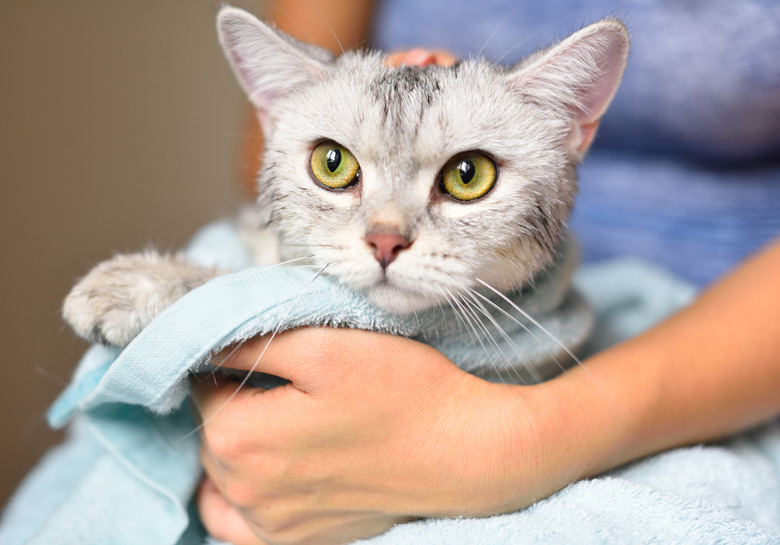Safe Soaps For Cats
Disclosure: At Cuteness, we are committed to being the go-to resource for pet owners and animal lovers. We only recommend products we think our audience will love. If you purchase something by clicking on one of these links, we may receive a small commission of the sale and the retailer might receive some data for accounting purposes.
There's nothing like soaking in a suds-filled tub to relax, but your cat probably won't agree. After all, cats aren't exactly the biggest fans of baths or water either for that matter. That's perfectly OK, though, because felines are generally self-cleaning pets, requiring minimal grooming. Still, there are certain situations that may call for you to bathe your cat, much to her chagrin.
Although your cat may not enjoy a bath, some nice soapy water will clean away everything from dirt and grime to sticky, smelly, yucky, or potentially dangerous substances from his coat. That's why it's so important to pick a good soap that will effectively clean his skin and coat with ingredients that are safe to use on him.
Cat-specific soap is best
When it comes to choosing a soap that's safe to use on your cat's coat, the easiest and safest choice is one designed specifically for felines. These shampoos are formulated to keep your cat's skin and coat clean and moisturized. They're also pH balanced for her skin so they won't dry it out.
Get your kitty fluffy and soft with Espree Natural Silky Show Cat Shampoo or find feline-friendly versions of your own favorite brands such as Burt's Bees for Pets Hypoallergenic Shampoo with Shea Butter and Honey. There are also pet shampoo soap bars that are safe for cats, such as this sudsy bar on Amazon.
If you're using a flea shampoo on your cat, be sure to follow the manufacturer's instructions and don't use it on very young kittens, pregnant cats, or nursing mother cats. That's because the insecticides these shampoos usually contain can harm them in some cases, so you'll need to speak with your vet first.
Most importantly, don't use soap designed for dogs on your cat. It could contain ingredients, like fragrances, insecticides, or essential oils, that are safe for dogs but not safe for cats. Some products, like John Paul Pet Oatmeal Shampoo for Dogs and Cats are specifically formulated to be safe for both species, making it simple to bathe multiple pets in the household.
Natural isn't always better
Many natural soaps and shampoos contain plant-based essential oils to scent them. Although these oils impart a pleasant aroma to the soap and are perfectly safe for people, they aren't safe for cats. In fact, essential oils are considered to be toxic to cats because your cat's liver doesn't produce the enzyme necessary to metabolize these oils. Because essential oils can be absorbed by the skin, it's best to steer clear of them in any soaps that you plan to use on your cat.
Some essential oils contain chemicals called phenols and phenolic compounds, which may also be harmful to cats. For example, tea tree oil, peppermint oil, cinnamon oil, citrus oil, and pine oil are rich in these compounds, making them even more potent and potentially toxic to your cat.
If your cat is exposed to essential oils, she could experience symptoms like drooling, vomiting, trouble breathing, shakiness, low body temperature, or even liver failure. If you notice any of these symptoms, take your cat to the emergency veterinary clinic as soon as possible.
Baby shampoo and castile soap
Although not ideal, you can safely use unscented human baby shampoo or a gentle, unscented castile soap on your cat. You can even buy castile soap by the gallon on Amazon and use it for everything from laundry to your cat's bathtime.
These types of soaps and shampoos are closer to a neutral or alkaline pH than adult shampoos, which is better for cats because their skin is slightly more alkaline than human skin. These soaps also contain moisturizers that will help prevent your cat's coat from becoming too dry. In fact, castile soap is made from vegetable oils, so it's naturally moisturizing and gentle.
Soaps that aren't recommended
Human shampoo and soap is pH-balanced for people, not for cats, and can quickly dry out your cat's skin if used frequently. This can lead to itching, flaking, and even skin infections over time. It may also contain harmful fragrances or essential oils that may be absorbed by the skin or licked off by your cat.
Dish soap that's unscented is handy for removing fleas, oil-based substances, and skunk spray from your cat's coat. Because this type of soap is very drying to your cat's skin and coat, however, it should only be used for emergency situations rather than all the time.
Wipes and waterless shampoo
For the feisty feline who simply won't take a dip in the tub, you can also use cat-specific premoistened wipes and waterless shampoos on his coat to keep him clean and fresh. Waterless shampoos don't have to be rinsed out of the fur and are safe for cats to lick off. Check the label, though, as some aren't safe for kittens younger than 3 months old.
References
- ASPCA: Cat Grooming Tips
- PetMD: How to Bathe a Kitten
- Pet Poison Helpline: Essential Oils and Cats
- ASPCA: Is the Latest Home Trend Harmful to Your Pets? What You Need to Know!
- Humane Society of the United States: Flea and Tick Product Ingredients: What You Should Know
- PetMD: Treating Cats With Dog Flea and Tick Products
